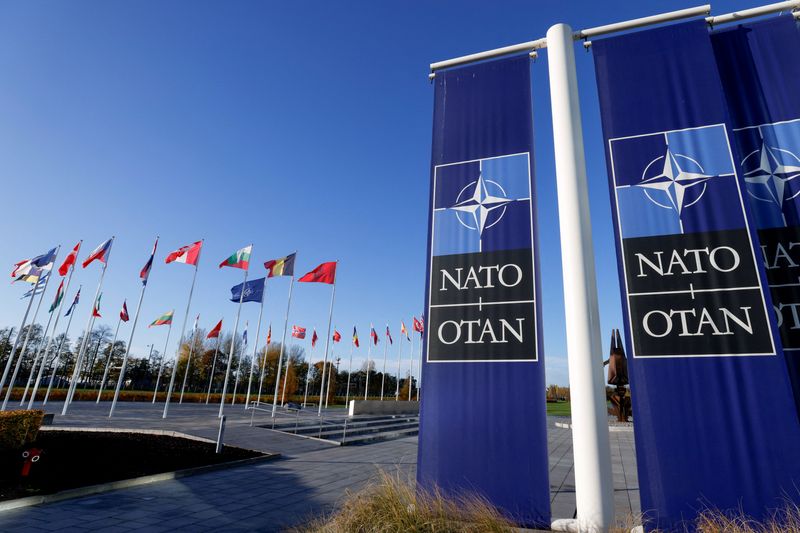Factbox-The Baltic states and their strategic significance for NATO
2023.07.07 08:02

© Reuters. FILE PHOTO: Flags fly outside NATO headquarters in Brussels, Belgium, November 16, 2022. REUTERS/Yves Herman
By Andrius Sytas
VILNIUS (Reuters) – NATO holds a summit on July 11-12 in Lithuania, one of the three Baltic states that lived under Soviet rule for decades and were among the first NATO countries to send weapons to Kyiv after Russia’s invasion of Ukraine.
Here are some details about the Baltic states – Estonia, Latvia and Lithuania — and their role in NATO:
HISTORY
The Baltics were the last states to become part of the Soviet Union, when they were annexed in 1940, and the first to declare independence in 1990 when the bloc collapsed.
Tens of thousands of people from the three countries were forcibly relocated to Siberia in the 1940s and a post-World War Two uprising against Soviet rule was brutally crushed.
Many Russians settled in the region during the Soviet era. They and their descendants make up about quarter of the populations of Latvia and Estonia.
VULNERABILITIES
The three Baltic states, which have a combined population of about 6 million, are largely made up of flat forested terrain that is squeezed between the Baltic sea to the west and north and Russia and its ally Belarus in the east.
Russia and Belarus have military bases along the border.
Lithuania is the only one of the three states to have a land link to a fellow NATO ally, Poland. The border, in the so-called Suwalki Gap, is a stretch of forest that lies between Belarus and Russia’s Kaliningrad enclave.
“Russia considers the Baltic states to be the most vulnerable part of NATO, which would make them a focus of military pressure in the event of a NATO-Russia conflict,” Estonian counterintelligence said in a report in 2023.
RAND Corporation, a U.S. research institute, estimated in 2016 that Russia could overwhelm the three states in 60 hours.
RUSSIA AND UKRAINE
Since 1991, the Baltics have grown more prosperous than Russia and have sought to deepen their ties to Western allies with integration into NATO, the European Union and other Western blocs. They have also built close ties to the United States.
They have been among the most hawkish on how the West and others respond to Russia’s invasion of Ukraine. All three have lobbied NATO to outline a path for Ukraine to become an alliance member and have pressed for tougher sanctions on Moscow.
Vilnius is home to leading members of the Anti-Corruption Foundation, a group established by jailed Russian opposition leader Alexei Navalny. It is also a refuge for Belarus opposition leader Sviatlana Tsikhanouskaya.
The three Baltic states have also attracted journalists who have fled Russia.
DEFENCE
Spurred by Russia’s annexation of Crimea in 2014, the three Baltic states sharply increased military spending.
They are in the top 10 in NATO in terms of how much they spend compared to the size of their economies. According to NATO estimates for 2022, all three exceeded the NATO agreement to spend 2% of gross domestic product on defence.
But their economies are small and so are their militaries.
Since 2017, NATO has rotated three battlegroups through the region with a total of about 3,000 troops, provided by Germany, Britain and Canada. The deployment of 1,000 soldiers in each Baltic state was designed as a deterrent to slow any attack.
Since the invasion of Ukraine, the Baltic states have requested the forces deployed are beefed up to 3,000-5,000 troops in each state. They have also requested extra air defences and asked that warplanes that patrol their airspace become a fighting force.
German Defence Minister Boris Pistorius pledged Germany would permanently deploy 4,000 troops in Lithuania in a few years, once Lithuania builds the infrastructure to house them.
Estonian officials said their defence needs had been met by a British fighting force, which is based outside Estonia but which can be deployed to Estonia within days in a crisis.
Canada has yet to announce any plans to boost its troops that are based in Latvia.








